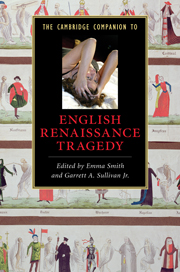Book contents
- Frontmatter
- Part 1 Themes
- Part II Readings
- 11 The Spanish Tragedy and metatheatre
- 12 Doctor Faustus: dramaturgy and disturbance
- 13 Edward II: Marlowe, tragedy and the sublime
- 14 Arden of Faversham: tragic action at a distance
- 15 The Revenger’s Tragedy: Original Sin and the allures of vengeance
- 16 The Tragedy of Mariam: political legitimacy and maternal authority
- 17 The Changeling and the dynamics of ugliness
- 18 The Duchess of Malfi: tragedy and gender
- 19 ’Tis Pity She’s a Whore: the play of intertextuality
- Index
14 - Arden of Faversham: tragic action at a distance
from Part II - Readings
Published online by Cambridge University Press: 28 November 2010
- Frontmatter
- Part 1 Themes
- Part II Readings
- 11 The Spanish Tragedy and metatheatre
- 12 Doctor Faustus: dramaturgy and disturbance
- 13 Edward II: Marlowe, tragedy and the sublime
- 14 Arden of Faversham: tragic action at a distance
- 15 The Revenger’s Tragedy: Original Sin and the allures of vengeance
- 16 The Tragedy of Mariam: political legitimacy and maternal authority
- 17 The Changeling and the dynamics of ugliness
- 18 The Duchess of Malfi: tragedy and gender
- 19 ’Tis Pity She’s a Whore: the play of intertextuality
- Index
Summary
While it is hardly a revelation that Elizabethan tragedies involve supernatural phenomena, domestic tragedies receive more attention for their social relations than their engagement with the occult. But a close examination of the genre indicates that the representation of ordinary communities can include the labour of cunning folk or the appearance of marvels in domestic spaces. Preternatural experiences - incidents that seem to exceed nature yet remain unattributed to God or the devil - are woven into the fabric of the everyday in these plays. The category of the preternatural, which included 'strange weather, figured stones, petrifying springs, the occult virtues of plants and minerals', proved central to discussions of natural philosophy, medicine, demonology and household knowledge. Natural philosophers turned to the preternatural to challenge traditional conceptions of 'science'. Books of secrets disseminated preternatural knowledge among a variety of people, including 'readers of meanest capacities' and invited participation in the discovery and manipulation of nature's hidden forces. Challenging the view that everyday life and preternatural phenomena reside at different ends of the spectrum, this essay considers how the representation of occult forces in Arden of Faversham proves central to our understanding of causation and agency in domestic tragedies.
- Type
- Chapter
- Information
- The Cambridge Companion to English Renaissance Tragedy , pp. 188 - 199Publisher: Cambridge University PressPrint publication year: 2010
- 1
- Cited by

